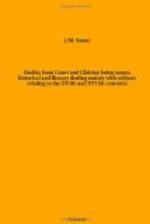After desiring her to accept favourably Henry’s message, which, he says, much concerns the wealth of her son and her own repute, the cardinal urges her brother’s hope that the “undeceivable spirit of God, which moved him to send to her, will effectually work.” Amid the cares of his government he has never forgotten her, and he hopes she will turn to God’s word, “the vyvely doctrine of Jesus Christ, the only ground of salvation” (1 Cor. 3). He reminds her of the divine ordinance of inseparable matrimony, first instituted in Paradise, and hopes her Grace will perceive how she was seduced by flatterers to an unlawful divorce from “the right noble Earl of Angus,” etc., upon untrue and insufficient grounds. Furthermore, “the shameless sentence sent from Rome” plainly showed how unlawfully it was handled, judgment being given against a party neither present in person nor by proxy. He urges her further, for the weal of her soul, and to avoid the inevitable damnation threatened against “advoutrers,” to reconcile herself with Angus as her true husband, or out of mere natural affection for her daughter, whose excellent beauty and pleasant behaviour, nothing less godly than goodly, furnished with virtuous and womanly demeanour, should soften her heart. That she should be reputed baseborn cannot be avoided, except the queen will relinquish the “advoutrous” company with him that is not, nor may not be, of right her husband.*
* Calig. B 6, 194.
The individual here mentioned was Harry Stuart, with whom Margaret had contracted a secret marriage, having by dint of perjury and a tissue of lies, obtained a declaration of invalidity against her union with Angus. She does not appear to have been in the least affected by Henry’s hypocritical reasoning, but the manner in which her son received the news of her third marriage caused her some inconvenience. In his displeasure, James sent Lord Erskine to besiege his mother and her new husband in Stirling Castle; but what promised to be a tragedy had a somewhat ridiculous end, for Margaret, in terror of what might follow, at once gave up her husband, who after a short imprisonment was allowed to escape. He promptly rejoined the queen, and James subsequently forgave him, and created him Lord Methven.
But not even when her son had come to his own did Margaret cease to plot and intrigue. Henry’s suspicious character imperatively demanded that all that was going on in Scotland should be known without delay at the English court, and his sister was the only possible agent for the purpose. It does not appear that her treachery, now doubly odious, ever cost her the least qualm. The climax was, however, reached, when after persuading James to confide to her his private instructions to the Scottish ambassador residing in London, she contrived that the information thus obtained should be in Henry’s hands at the same moment that it reached its legitimate destination.
Fortunately for the affairs of Scotland, the treasonable correspondence was discovered; and Margaret narrowly escaped imprisonment. The immediate result was to put an end to the more friendly intercourse that had sprung up between the two countries, and to prevent a meeting between the two sovereigns, in process of negotiation.




